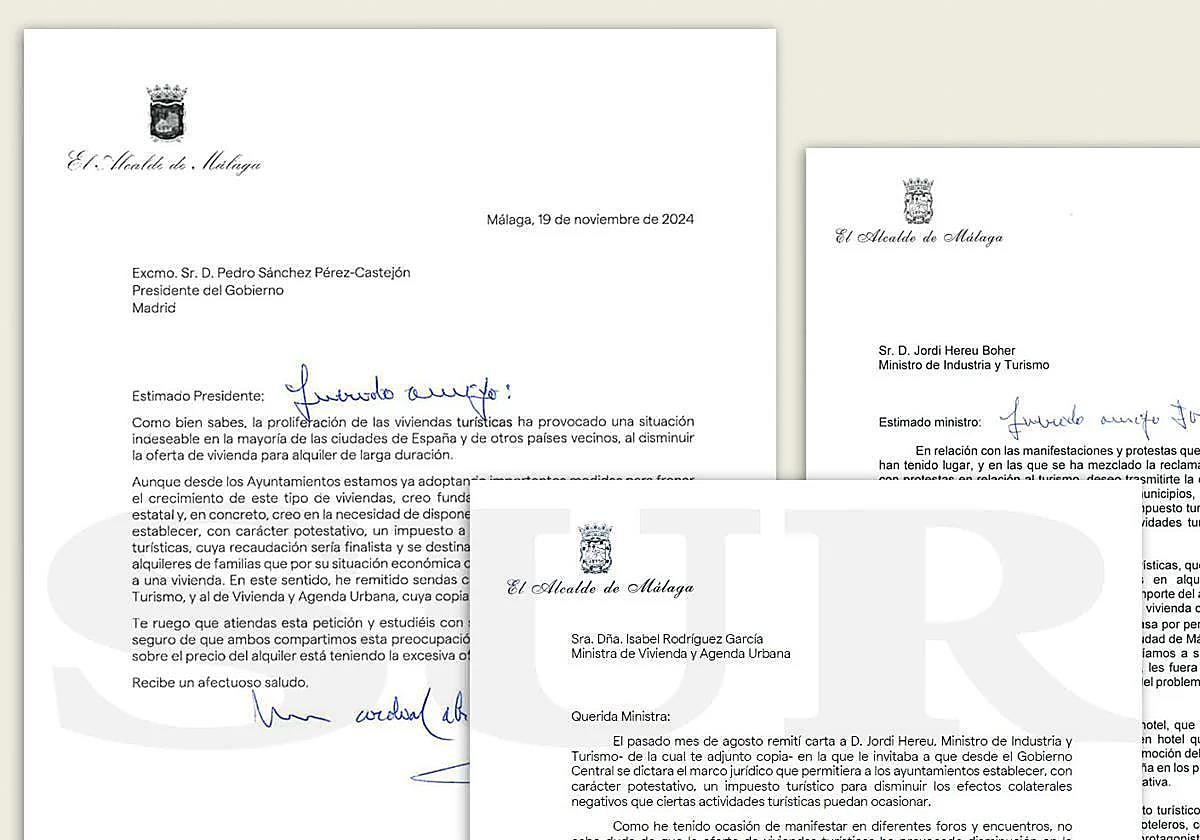Malaga mayor calls on Spanish PM for daily tax of two or three euros on tourist apartments and hotels
In a letter sent to Pedro Sánchez this week, Francisco De la Torre declared the effect of these tourist rentals in particular to be "undesirable... by reducing the supply of long-term rental housing" in the city
Malaga city council's war on tourist apartments is being taken to central government in Moncloa. The mayor of Malaga, Francisco de la Torre, sent a letter on Tuesday to Prime Minister Pedro Sánchez, in which he asks for the creation of a legal framework to establish a tax per overnight stay of two to three euros per person per day in tourist homes and hotels in the city. The letter begins with the mayor stating that the proliferation of this type of holiday rental has caused an "undesirable" situation in the city by reducing the supply of long-term rental properties.
After reminding the PM of the actions being carried out by his council to limit the growth of new holiday rental licences, he calls for state collaboration in order to have the legal framework that "allows us to establish, on a voluntary basis, a tax on overnight stays in tourist homes." However, this tax is also extended to hotel stays, mentioned in the first of three letters on this subject sent to the government, addressed to the Minister of Industry, Trade and Tourism, Jordi Hereu. In fact, the letter to Sánchez includes a copy of the letter sent to Hereu in August after the protests in the Canary Islands, Malaga and Palma de Mallorca, and the one sent to the Minister of Housing and the Urban Agenda, Isabel Rodríguez, last October.
In the opening greeting to Sánchez, De la Torre gives him the same treatment as he did in his letter to Hereu by including "dear friend" in his own handwriting. De la Torre explains in this letter that the aim of this legal framework is that the revenue from this new tax will be used "entirely to subsidise the rents of families whose economic or social situation makes it very difficult for them to access housing." In fact, in the letter sent to the Minister of Tourism, which is the most detailed and in which the mayor gives more details of his proposal for this new tax, he explains that, if this tax were to be applied, the council could collect between 20 and 30 million euros, especially as "it would be seen as a direct action on the part of the person causing the problem to resolve the situations created." To this should be added the amount collected from the hotels, which he acknowledges would be a smaller amount because of the lower number of vacancies, and which would be directly applied to the promotion of quality tourism. De la Torre considers that "tourism of excellence must be Spain's main objective in the coming years and from Malaga we want to contribute to this in a significant way."
The letter to the PM ends by asking him to heed this request and to study it with "the utmost interest. I am sure that we both share this concern and wish to alleviate the effects that the excessive supply of tourist accommodation is having on rental prices."
In the letter to Minister Hereu, Malaga's mayor states that this type of holiday rental has produced a drop in the number of properties available for long-term rent and "inevitably a significant increase in the amount of rent and, indirectly, a disproportionate increase in the price of housing."
In the same letter he makes it clear to the Minister that "only those municipalities that have reached a consensus with the sector on how to do it, allowing those involved in it to have a clear control that the income is destined to improve the situation and alleviate the negative effects of the excessive development of tourist accommodation, could create these taxes or tourist tax." He goes on to stress that this requires central government to create a legal framework within the scope of the Law of Local Treasuries (RD 29/2021) that "allows us, on a voluntary basis, to introduce the tourist tax for overnight stays in the cities where we see the need to do so. Subsequently, we can share the practices that we establish in each city, and learn from each other, coordinating through FEMP [the Spanish federation of municipalities and provinces] or the corresponding regional federations."
De la Torre insists that this legislative framework opens the door to initiatives that "would curb, and I am sure eliminate, these currents of opinion against tourism that have been created, some spontaneously, and others with irresponsible political intent" and he appeals to Hereu's past as mayor of Barcelona to understand "to what extent we can collaborate from the municipal level to curb these manifestations of tourist phobia that inevitably harm Spanish tourism in general, and to redirect the feelings of the residents of the city that welcomes tourists towards understanding and recognising the contribution that tourists make with this tax, to solve social problems or to improve the quality and excellence of the tourism that comes to each city."
However, Minister Hereu responded firmly that measures on the set-up of the tourist offer, such as tourist taxes, "have to be taken from closer to home" and pointed out that "it is very important that city councils and the autonomous regions assume their responsibilities because proximity is what gives knowledge of the reality." Moreover, in statements made before attending the preliminary regatta of the America's Cup sailing competition in Barcelona, he expressed his opposition to "generalising measures from the State when they have to be taken from a local level."
However, De la Torre did not give up and on 18 October he sent another letter along the same lines to the Minister for Housing and the Urban Agenda in which he stated that "what we must do, from our respective political responsibilities, is to define formulas that make it possible for tourism to coexist with the needs of our local residents. For this reason, although various municipalities are already making progress in adopting the necessary regulatory measures to limit the proliferation of this type of housing, I believe it is essential to have this tax as an additional measure." Moreover, the letter ends by suggesting that "Malaga can serve as a pilot project and extrapolate our experience to other municipalities that show interest in this formula."
The "undesirable" impact of holiday rentals
Without mincing his words, Malaga's mayor Paco de la Torre did not hesitate to describe to PM Sánchez in his letter the effects of the proliferation of tourist accommodation in Malaga city as "undesirable", directly blaming this type of accommodation offer for the main housing problems in the city - that is, the shortage of long-term rental properties and the rise in property prices.
In his letter he recalled the actions taken by Malaga city hall in the war against these holiday rental properties, meaning that, from next month, the creation of new tourist rental licences will be banned in 43 neighbourhoods of the provincial capital. This was approved on Monday at the meeting of the full committee for urban planning. It was agreed to modify the general plan of urban planning (PGOU) to prevent the registration of new holiday rentals in areas of the city in which these represent or exceed 8% of the residential stock. The measure will be endorsed at the next full meeting of Malaga council on 28 November, with the idea of publishing it in the Official Provincial Gazette for immediate implementation. This restriction is in addition to the measure already in place for the districts that remain outside this ban, in which Malaga limits tourist rental licences to properties with independent access and services.

